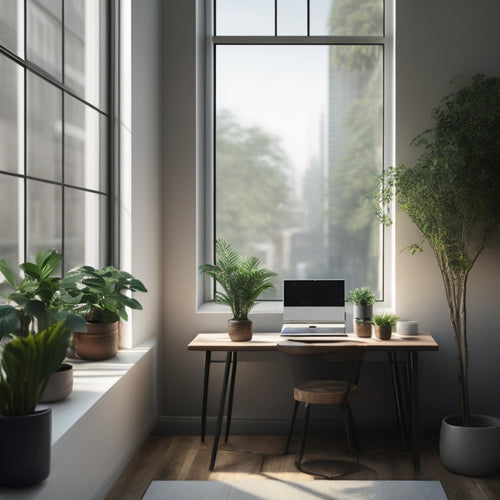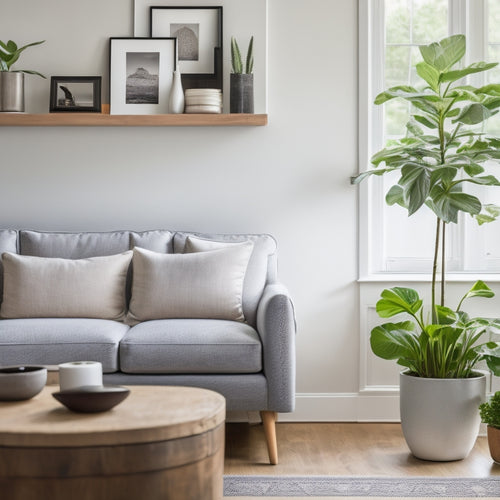
What's Holding You Back From Ultimate Home Organization?
Share
You're struggling to achieve ultimate home organization due to hidden obstacles in your daily habits and mindset. Insufficient storage space and disorganized digital clutter are likely culprits, wasting your time and energy. Inefficient use of time, unrealistic expectations, and procrastination habits are also holding you back. Additionally, emotional attachments to items and fear of letting go are cluttering your space and mind. Inadequate systems and unclear goals are further hindering your progress. By recognizing and tackling these challenges, you'll uncover the clarity, focus, and productivity you need to achieve your organized haven - and it all starts with taking the next step.
Key Takeaways
• Insufficient storage space and inefficient use of available space hinder home organization efforts.
• Disorganized digital clutter, including paperwork and passwords, contributes to feelings of overwhelm and wasted time.
• Unrealistic expectations, procrastination habits, and inefficient use of time are significant obstacles to achieving ultimate home organization.
• Emotional attachment to items and fear of letting go prevent individuals from decluttering and creating space for new experiences and growth.
• Lack of clear goals, routines, and priorities leads to inconsistent motivation and maintenance of an organized space.
Lack of Storage Space
Overcrowded closets, cluttered countertops, and cramped living spaces are all telltale signs that you're struggling with a lack of storage space. It's frustrating, but don't worry – it's not impossible to overcome.
The key is to get creative with your storage solutions. Think vertical: install shelves, hooks, and storage units that maximize your wall space. Utilize hidden areas like under-bed storage bins, hollowed-out books with secret compartments, or ottomans with built-in storage.
Decluttering strategies are also essential in tackling this issue. Adopt a minimalist living approach by letting go of items you no longer need or use. Be ruthless – if you haven't used it in the past year, it's probably safe to get rid of it. By doing so, you'll not only free up physical space but also mental energy.
Disorganized Digital Clutter
Now that you've tackled your physical space, it's time to turn your attention to the digital domain.
You're likely no stranger to digital clutter, with files scattered across your computer and passwords piled up on sticky notes.
As you start to organize your digital life, you'll quickly realize that two key areas need attention: the chaos of digital files and the forgotten passwords that are holding you back.
Digital File Chaos
You're likely no stranger to the frustration of wasting hours searching for a specific document or file amidst the digital clutter that's accumulated on your computer or devices. This digital file chaos isn't only time-consuming but also stressful, making it difficult to focus on more important tasks.
The first step to overcoming this chaos is to create a paperless office by digitizing your documents and files. This won't only free up physical storage space but also make it easier to access and manage your files.
To take it to the next level, consider investing in cloud storage solutions like Google Drive, Dropbox, or OneDrive. These services allow you to store and access your files from anywhere, at any time, and on any device. They also provide automatic backups, version control, and collaboration features, making it easier to work with others.
Forgotten Password Piles
Managing a multitude of passwords for various online accounts can lead to forgotten password piles, a common symptom of disorganized digital clutter. You're not alone if you've experienced memory loss when trying to recall login credentials.
This digital disorganization can lead to wasted time, frustration, and even security risks.
To combat this issue, consider investing in a reliable password manager. This tool will securely store and generate unique, complex passwords for each account, freeing you from the burden of remembering them all.
With a password manager, you'll only need to recall a single master password to access your entire digital domain.
Inefficient Use of Time
You're likely no stranger to feeling like there just aren't enough hours in the day to get everything done.
But the truth is, it's not about the amount of time you have, but how you're using it.
Wasting Precious Morning Hours
Every morning, 60 precious minutes slip away as you hit the snooze button, scroll through social media, or indulge in other time-wasting habits that set your day off on the wrong foot. These habits not only rob you of valuable time but also set a sluggish tone for the rest of the day.
By optimizing your morning routine, you can create a sense of control and momentum that carries over into the rest of your day.
To maximize your morning, start by identifying time-wasting habits and replacing them with intentional activities that align with your goals. This might mean waking up 30 minutes earlier to meditate, journal, or plan out your day.
Effective time management is key to achieving ultimate home organization. By prioritizing your morning routine, you'll be more focused, productive, and better equipped to tackle the tasks that really matter.
Don't let another morning slip away – take back control of your time and set yourself up for success.
Procrastination Kills Productivity
Procrastination Hampers Productivity
By postponing tasks until the last minute, you're not only delaying progress but also depleting your mental energy and creating a perfect storm for inefficiency to thrive.
When you procrastinate, you're sacrificing your productivity and allowing tasks to pile up, making it even harder to get organized.
To break this cycle, it's crucial to focus on effective time management. Start by prioritizing tasks based on their importance and deadlines.
Make a to-do list and allocate specific time slots for each task. This will help you stay on track and ensure that you're making progress towards your organizational goals.
Multitasking Is a Lie
In today's fast-paced world, attempting to juggle multiple tasks simultaneously can be a recipe for disaster, as it inevitably leads to mental fatigue, decreased focus, and a significant drop in overall productivity. You may think you're getting more done, but the truth is, you're only fragmenting your attention and energy.
Effective time management is about prioritizing tasks and tackling them one by one. This approach allows you to maintain focus discipline, ensuring that each task receives your undivided attention. By doing so, you'll produce higher-quality work, complete tasks more efficiently, and minimize the likelihood of errors.
When you try to multitask, you're constantly switching between tasks, which can lead to a 40% decrease in productivity. Instead, allocate specific time slots for each task, and stick to your schedule. This will help you stay on track, avoid procrastination, and achieve your organizational goals.
Unrealistic Expectations
Setting unrealistic goals for your home organization project can lead to frustration and burnout, as you're likely to feel overwhelmed by the sheer scale of the task ahead. You might think you can organize your entire home in a weekend, but that's simply not feasible. With an unrealistic mindset, you'll set yourself up for disappointment and exhaustion.
A perfectionist mindset can be particularly damaging, as it can lead you to aim for an unattainable ideal of organization. To avoid this trap, take a step back and assess your goals. Break down your project into smaller, manageable tasks that you can realistically complete. Be honest with yourself about how much time and energy you have available.
Procrastination Station
You'll likely find yourself stuck at the Procrastination Station if you're waiting for the ideal moment or until you feel motivated to start organizing your home. Newsflash: that moment might never come.
Procrastination often stems from poor time management, leading to a mental block that prevents you from taking action. To overcome this hurdle, break down your organizing tasks into smaller, manageable chunks, and schedule them into your daily or weekly routine. This will help you build momentum and make progress, no matter how small.
Set a timer for 10 or 20 minutes and challenge yourself to focus on a single task during that time. When the timer goes off, take a short break before resuming. By doing so, you'll create a sense of accomplishment and make organizing less overwhelming.
Cluttered Mind Cluttered Space
As you start tackling your organizing tasks, it's likely you'll discover that your cluttered living or work space is often a reflection of your cluttered mind. When your thoughts are disorganized, it's natural to see that chaos spill over into your environment. To achieve an organized space, you must first address the clutter in your mind.
Here's a breakdown of how your mental state can impact your space:
| Mental State | Physical Space | Result |
|---|---|---|
| Cluttered mind | Cluttered space | Feelings of overwhelm and anxiety |
| Racing thoughts | Disorganized area | Difficulty focusing and making decisions |
| Peaceful mind | Organized space | Sense of calm and increased productivity |
| Clear priorities | Tidy environment | Clarity of purpose and direction |
Fear of Letting Go
Frequently, the biggest obstacle to achieving an organized space is your own fear of letting go of items that no longer serve a purpose. You're not alone in this struggle. Emotional attachment to certain items can make it difficult to part with them, even if they're no longer useful. This attachment can stem from sentimental value, memories, or a sense of obligation.
Here are three common examples of items that might be holding you back:
-
Old family heirlooms: You might feel guilty getting rid of Grandma's antique vase, even if it no longer fits your personal style.
-
Unused gifts: You might feel obligated to keep that sweater your aunt gave you, even if it doesn't fit or suit your taste.
-
Childhood mementos: You might struggle to part with your child's artwork or baby clothes, even if they're no longer needed.
To overcome this fear, it's crucial to undergo a mindset shift. Recognize that letting go of these items doesn't mean you're erasing the memories or emotions attached to them. Instead, it means you're making space for new experiences and memories to be created.
Inadequate Systems Failure
Now that you've overcome the emotional hurdles of letting go, it's time to turn your attention to the logistical aspects of maintaining an organized space, where inadequate systems can lead to clutter and disarray. You might be surprised to find that inconsistent routines are a major culprit behind your organizational struggles.
Maybe you clean your living room one day, but then let it slide for weeks. Or, you establish a morning routine, only to abandon it after a few days. These mental roadblocks can be tough to overcome, but recognizing them is the first step to creating a more organized space.
Another common obstacle is a lack of motivation. You might feel overwhelmed by the sheer amount of work required to get your home organized. This can lead to procrastination, which only exacerbates the problem. To combat this, break down larger tasks into smaller, manageable chunks.
Create a schedule and stick to it. Celebrate your small victories, and use them as motivation to keep moving forward. Remember, developing an organized system takes time and effort, but the payoff is well worth it.
No Clear Goals Set
Without clear goals, you're likely to tackle organization projects haphazardly, wasting time and energy on tasks that may not align with your priorities. You might find yourself jumping from one task to another, never really making progress towards your desired level of organization. This lack of direction can be frustrating and demotivating.
Here are three common scenarios that may occur when you don't have clear goals:
-
You spend hours organizing a single area, only to realize it's not a priority: You've invested time and effort, but it doesn't make a significant impact on your daily life.
-
You get sidetracked by non-essential tasks: You find yourself decluttering a drawer, but neglecting more critical areas, like your kitchen or entryway.
-
You struggle to maintain your space: Without a clear plan, you may not establish routines to maintain your organized space, causing clutter to creep back in.
To overcome this, focus on setting priorities, practicing effective time management, and establishing routines to stay focused. By doing so, you'll be able to create a tailored plan that addresses your specific organizational needs, helping you achieve ultimate home organization.
Frequently Asked Questions
How Do I Get My Family Members on Board With Organization Efforts?
You'll get your family on board with organization efforts by using effective communication strategies, involving kids in decluttering decisions, setting boundaries, and working together to create a more organized home that works for everyone.
Can I Really Get Organized if I'm Not a Naturally Organized Person?
Imagine yourself effortlessly gliding through your day, with every item in its place. You can achieve this, even if you're not naturally organized, by learning and adapting effective organizing strategies to overcome your personal challenges.
How Often Should I Reassess and Adjust My Organizational Systems?
You should reassess and adjust your organizational systems regularly, ideally every 3-6 months, to guarantee they're still serving you. Reflect on your time management, decluttering techniques, storage solutions, and productivity hacks to refine your approach and maintain momentum.
What if I'm Overwhelmed and Don't Know Where to Start Organizing?
Imagine standing in front of a messy room, feeling like a sailor lost at sea. Take a deep breath, and anchor yourself with a simple plan: declutter first, prioritize later, and celebrate small wins for big impact, clearing the way to calmer waters.
Is It Possible to Maintain Organization While Still Being Creative and Spontaneous?
"You can absolutely maintain organization while staying creative and spontaneous. By implementing flexible systems and embracing creative solutions, you'll find a balance between structure and freedom, allowing you to thrive in a space that sparks inspiration."
Related Posts
-

Transform Your Space: 5 Online Courses to Help
Ready to transform your space from cluttered to calm? Start with mastering home organization fundamentals, like declu...
-

Organize Your Digital Photos With These Online Courses
You've accumulated thousands of digital photos, and finding a specific one has become overwhelming. It's time to orga...
-

7 Essential Android Apps for a Clutter-Free Home
You're just a few taps away from transforming your cluttered space into a serene and organized oasis. Start by gamify...


